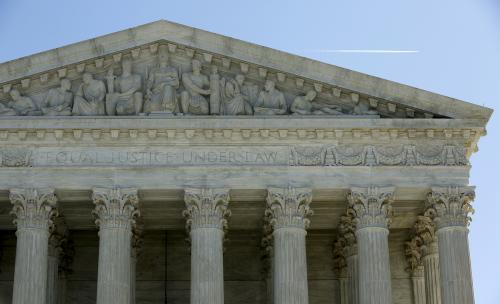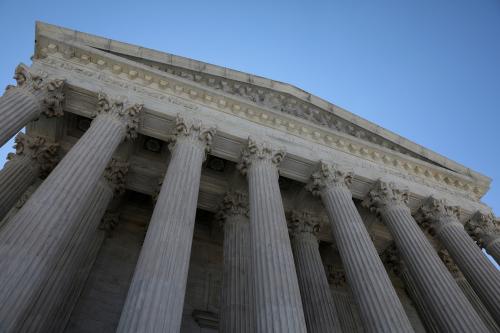On July 20, 2021, Benjamin Wittes, senior fellow in Governance Studies at The Brookings Institution, testified before the Presidential Commission on the Supreme Court of the United States during a panel entitled, “Perspectives from Supreme Court Practitioners and Views on the Confirmation Process.” In his testimony, Wittes discussed the relationship between the confirmation process for Supreme Court justices and the ongoing calls for reform and enlargement of the court.
Co-chairs Bauer and Rodriguez and members of the commission, thank you for your invitation to testify today on the relationship between the confirmation process for Supreme Court justices and the ongoing calls for reform and enlargement of the court. I would like to make five broad points today:
- First, the decay of the confirmation process is intimately connected with calls for court reform, enlargement, and related schemes. Indeed, the decay of the confirmation process is the but-for cause of the current agitation.
- Second, the decay of the confirmation process has been a bipartisan affair in which neither Republicans nor Democrats have refrained from escalation and in which both sides perceive themselves as playing defense—and routinely take offensive measures believing they are engaged in preemptive self-defense.
- Third, in the escalatory cycle that has developed, court enlargement or related changes are the logical next step. They are likely to happen exactly as soon as one political party or the other controls the levers of power sufficiently to make them happen. Because both sides believe, probably correctly, that the other side would take these steps if given the chance, both are likely to take them as a preemptive measure as soon as the chance presents itself.
- Fourth, the best way to head off a tit-for-tat cycle of court enlargements and related manipulations is to do reform in a negotiated, deliberative fashion with an eye toward deescalating matters and lowering the stakes. The alternative to waiting until one side or the other has the power to act unilaterally to its own benefit is to redesign the system of nominations and confirmations in a fashion that both is durable and reduces the incentive to gamesmanship.
- Fifth, to this end, I propose a simple test of whether a court-altering proposal represents a constructive, deescalatory intervention or merely invites a retributive response when power alignments shift. When confronted with any reform proposal, I urge the commission to ask the following question: What response will this proposal, if enacted, engender when the House and Senate and presidency are in different hands? Will it incentivize a tit-for-tat response, or will it provide a durable basis to keep political temperatures as low as possible in our polarized political system?
Continue reading the full testimony here. Watch the full video of Wittes’s testimony (starting around the 1:00:34 mark) and the rest of the hearing below.
The Brookings Institution is committed to quality, independence, and impact.
We are supported by a diverse array of funders. In line with our values and policies, each Brookings publication represents the sole views of its author(s).






Commentary
TestimonyThe Supreme Court confirmation process and calls for reform
Benjamin Wittes's statement to the Presidential Commission on the Supreme Court of the United States
July 20, 2021